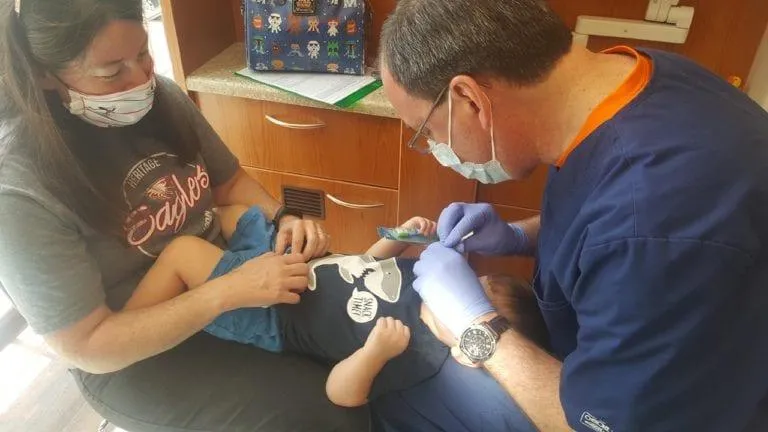WELCOME TO
HURST PEDIATRIC DENTISTRY!
Here at the pediatric dental office of Dr. Joby Hurst, we take pride in offering our young patients the highest quality of dental care in a kid-friendly environment. We are conveniently located in Birmingham, Alabama and are experienced in providing routine dental care for infants, children, teens and patients with special needs.
Dr. Hurst and his team of friendly professionals work together to provide a positive dental experience that will make your child smile! We promise to work with you and your child personally and create a customized treatment plan to meet your individual needs and desires.
Office tour
Early Dental Care
We believe early dental care can promote a lifetime of healthy smiles for your child. We offer a full range of services from routine dental exams and cleanings to fillings, sealants and fluoride treatments that will help ensure that your child grows up with a healthy smile.
Sedation Dentistry
We recognize that for some of our patients, a visit to the dentist makes them a bit nervous.
We offer nitrous oxide sedation for our more apprehensive patients, so they can relax while receiving the dental care that they need.
For those requiring more intensive treatment, Dr. Hurst offers in office anesthesia using Dr. Jeff Plagenhoef.
Dr. Jeff is a board-certified pediatric anesthesiologist with Pediatric Dental Anesthesia Associates.
We appreciate your interest in our practice and encourage you to continue exploring our website to learn more about us. Feel free to contact us to schedule an appointment with Dr. Joby Hurst today!

Blogs and Resources

How Much Fluoride Should My Child Be Getting?
As a parent, you have most likely heard of fluoride and its dental benefits. Dentists have probably recommended fluoride treatments for your child or recommended they drink water infused with it. The truth is, it can be very helpful to the integrity of children’s teeth, preventing cavities and strengthening enamel.
As it is with everything, too much of a good thing can be a bad thing. Consuming too much fluoride can cause problems in both children and adults, but used in the proper amounts, it has benefits for your child’s teeth.
What Is Fluoride?
Fluoride is a naturally occurring mineral that can be found in water, soil, plants, rocks, and air. In small amounts, it can be beneficial to the health of teeth. It can also sometimes be found in the public water supply in a process called water fluoridation. Each city decides for itself whether or not to add fluoride to its water supply. It can additionally be found in some foods, such as seafood, raisins, and potatoes.
Aside from the water supply and some foods, it is also in some brands of toothpaste and mouthwash. This is partially the reason why swallowing too much of them can be harmful. The most fluoride a toddler should have a day is 0.7 mg. For women, 3 mg, and for men, 4 mg.

Why Is Fluoride Good for Your Child?
Fluoride is a game-changer when it comes to keeping your child’s teeth healthy. It’s like a little superhero for their smile, helping to protect their teeth and keep them strong. Here’s why fluoride is so important for your kiddo:
Strengthens Tooth Enamel
Fluoride helps make the outer layer of your child’s teeth (the enamel) super tough. This means their teeth can handle all the sugar and acid they come across without breaking down as easily.Stops Cavities in Their Tracks
Nobody likes cavities, especially kids. Fluoride is great at not only preventing cavities but also fixing tiny problem spots before they turn into full-blown issues. It’s like giving their teeth an extra layer of armor.Helps Adult Teeth Grow Strong
Even if your child still has baby teeth, fluoride is already hard at work on their adult teeth that are forming under the gums. It makes sure those future teeth are strong and ready for action when they come in.Fights Bad Bacteria
Fluoride keeps the bacteria in your child’s mouth under control, cutting down on plaque and helping to prevent gum problems. It keeps things fresh and healthy in there!Saves You Time and Money
Dental work can get expensive, not to mention stressful. Fluoride helps prevent problems like cavities, which means fewer trips to the dentist for fillings or other treatments.Safe When Used Right
When you use fluoride properly, it’s totally safe for your child. Start with a tiny smear of fluoride toothpaste as soon as they get their first tooth, and switch to a pea-sized amount as they get older. Make sure they spit out the toothpaste, and you’re good to go.Boosts Their Confidence
A healthy smile can do wonders for your child’s confidence. When their teeth are strong and cavity-free, they’ll feel great about showing off their smile—and that’s a win for everyone.
How to Make Sure Your Child Gets Enough Fluoride
Encourage Tap Water: If your local water supply has fluoride, it’s an easy way to protect their teeth. Plus, it’s way better than sugary drinks!
Use Fluoride Toothpaste: Brushing twice a day with fluoride toothpaste is key. Keep an eye on them while they brush to make sure they’re using the right amount.
Ask About Fluoride Treatments: At your child’s regular dentist visits, ask about fluoride treatments. These quick, painless treatments can give their teeth some extra protection.
Check Their Diet: Foods and drinks fortified with fluoride can also help keep their teeth in top shape.
By making fluoride part of their daily routine, you’re setting your child up for a lifetime of strong, healthy teeth—and that’s something to smile about!

How Can You Tell If Your Child Is Getting Enough Fluoride?
Making sure your child gets the right amount of fluoride is key to keeping their teeth strong and healthy. But how do you know if they’re getting enough? Don’t worry—it’s pretty simple! Here’s what you can do:
1. Check Your Local Water Supply
If your tap water is fluoridated, your child is likely getting plenty of fluoride just by drinking it.
You can find out by visiting the CDC’s My Water's Fluoride tool. Just enter your location, and it’ll tell you if your water is fluoridated and how much fluoride it contains.
2. Ask Your Dentist or Pediatrician
At your child’s next check-up, ask their dentist about their fluoride intake. Dentists can spot signs of too little or too much fluoride and suggest things like fluoride treatments or supplements if needed.
Your pediatrician can also give you advice, especially for little ones who aren’t seeing a dentist yet.
3. Check Other Fluoride Sources
Fluoride isn’t just in water—it’s also in toothpaste, some mouthwashes, and even certain bottled waters. Read labels to see if these products contain fluoride.
For kids under 3, use a tiny smear of fluoride toothpaste (about the size of a grain of rice). For kids aged 3-6, use a pea-sized amount. This helps avoid too much fluoride.
4. Look at Their Diet
Fluoride is naturally found in some foods like tea, fish, and spinach. While it’s great to include these in their meals, they probably won’t provide enough fluoride on their own.
5. Watch for Signs of Too Much or Too Little Fluoride
Too Little Fluoride: If your child isn’t getting enough, you might notice more cavities or increased tooth sensitivity.
Too Much Fluoride: Overexposure can lead to dental fluorosis, which causes white or brown spots on the teeth. It’s mostly cosmetic but something to avoid.
6. Take Advantage of Community Resources
Some communities offer free or low-cost dental programs that include fluoride treatments for kids. It’s worth checking out if you live in an area without fluoridated water.
Keeping an eye on your child’s fluoride intake and talking to their dentist or doctor, you’ll have no trouble making sure their teeth stay strong and healthy. It’s just one more way to keep that smile shining!
What Happens If My Child Doesn’t Get Enough Fluoride?
Fluoride is not mandatory for children’s dental health, but it is highly recommended as it plays a crucial role in maintaining strong and healthy teeth. Fluoride strengthens tooth enamel, making it more resistant to acid attacks from bacteria and sugars in the mouth, which are primary contributors to tooth decay. Additionally, it can help remineralize early-stage cavities, reversing some damage before it worsens.
If your child doesn’t get enough fluoride, they may become more susceptible to tooth decay and cavities. Tooth decay can lead to pain, infections, and even early loss of primary (baby) teeth, which can affect the proper alignment and spacing of their permanent teeth. Poor oral health in childhood can also negatively impact overall health, including difficulties in eating, speaking, and concentrating at school due to discomfort.
Fluoride can be obtained from several sources, including fluoridated drinking water, toothpaste, mouth rinses, and professional fluoride treatments at the dentist’s office. However, it’s important to strike a balance.

Can Your Pediatric Dentist Tell If Your Child Needs More Fluoride?
Yes, your pediatric dentist is the best person to determine whether your child needs more or less fluoride. By talking to your child’s dentist and understanding the fluoride levels in your local water supply, you can ensure your child gets the right amount. Fluoride plays a vital role in preventing cavities and strengthening enamel, but the right balance is key.
When you visit the dentist, they will assess your child’s teeth to check for signs of inadequate fluoride. If they find that more fluoride is needed, they may recommend a fluoride treatment. This is a quick and simple process where fluoride is painted onto your child’s teeth. The fluoride is then left to soak in for a short period before being rinsed off, giving your child’s teeth extra protection.
If additional fluoride is necessary, your dentist might suggest supplements such as fluoride tablets, drops, or vitamins. These can help ensure your child receives enough fluoride, especially if your local water supply is low in fluoride or if your child’s diet lacks it.
Your dentist will also guide you on using fluoride toothpaste. For babies, use a tiny amount—just the size of a grain of rice. Once your child is 3 years old, you can increase this to a pea-sized amount. As you help your child brush their teeth, make sure to teach them to spit out the toothpaste instead of swallowing it. This habit not only prevents overexposure to fluoride but also helps them develop good oral hygiene practices.
Working closely with your child’s dentist, you can give your child the best foundation for a healthy smile. Regular check-ups will help ensure their fluoride intake is just right, keeping cavities at bay and their teeth strong.
Are There Any Dangers Of Fluoride?
For kids under age 8, too much fluoride consumption can cause something called dental fluorosis. Dental fluorosis is the whitening of children’s teeth due to too much fluoride. Fluorosis is not harmful and only affects how teeth look. Anyone over the age of 8 should not be worried about this occurring, as it only affects young children whose adult teeth are still emerging from their gums.
Some say that certain disabilities and conditions are linked to an overdose of fluoride, but there is no concrete scientific evidence of it. According to Healthline, multiple studies have been done on this topic. A study in 2006 concluded that fluoridated water consumption in childhood was linked to increased chances of bone cancer in men, but studies done in 2011 and 2016 respectively didn’t find any connection.
Healthline also mentions a different study done on the link between fluoridated water and low IQ scores in children. This 2012 study had mixed results, saying there may be a link, but larger and more detailed studies would need to be done.
Fluoride poisoning is also a possibility if there is extreme exposure. According to MedicalNewsToday, If you are exposed to too much of it, you can experience:
abdominal pain
excessive saliva
nausea and vomiting
seizures and muscle spasms
Fluoride poisoning is not common and usually only happens if drinking water is contaminated with an abundance of fluoride due to some kind of fire or explosion near the source.
Although fluoride can be potentially harmful in some extreme circumstances, it can be quite beneficial during the development of your child’s teeth. A pediatric dentist should be able to make recommendations for you specific to your child about using toothpaste with added fluoride and the overall quantity of it your child should have.
Bottom Line
So, how much fluoride should your child be getting? The key is finding that sweet spot—just enough to protect their teeth without overdoing it. Fluoride can work wonders for your child’s oral health, strengthening enamel, preventing cavities, and even helping their adult teeth grow strong. The good news is, by following a few simple steps—like using the right amount of fluoride toothpaste, encouraging them to drink fluoridated water, and talking to their dentist—you’re setting them up for a lifetime of healthy smiles.
Remember, you’re not alone in figuring this out. Your dentist is your best resource for personalized advice tailored to your child’s needs. With the right balance, you’ll help your little one keep their teeth strong, healthy, and ready to flash those confident smiles. Keep it up—you’ve got this!
Overall, the benefits of fluoride are worth the risks. With the right amount, your child’s teeth will become strong and resistant to tooth decay. Call us at (205) 969-7454 or contact us for more information.

19 INVERNESS CENTER PARKWAY, STE 250, BIRMINGHAM, AL 35242
TEL: 205.969.7454
E-MAIL: [email protected]
2018 © ALL RIGHTS RESERVED | PRIVACY POLICY | TERMS AND CONDITIONS
Site by Trustway Marketing Powered by Kyrios Systems